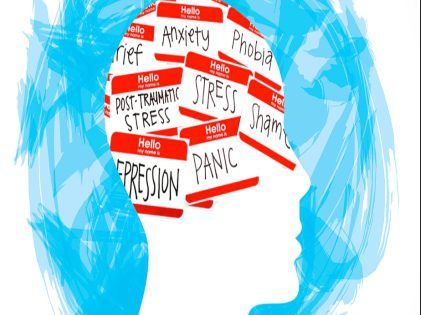
Taking Care of Your Mental Health: Where to Start?

Every year, millions of Americans are hit with the reality of struggling with mental illness. In May, NAMI, the National Alliance on Mental Illness, joined the national movement to create awareness concerning mental health. Every year, NAMI gives out support, fights the shame attached to the label of one being mentally unwell, makes awareness in public, and promotes the policies that support people with mental illness and their families.
 Mental health consists of emotional, psychological, and social well-being. There is no specific time to talk about issues and concerns related to mental health. The positive thing concerning this is that now people are willing to talk about their struggles regarding mental health, particularly after the world was hit with the pandemic, leaving behind its after-effects. This is why it has become more critical to create awareness regarding mental health and its struggles so that they know what to do when faced with such a situation.
Mental health consists of emotional, psychological, and social well-being. There is no specific time to talk about issues and concerns related to mental health. The positive thing concerning this is that now people are willing to talk about their struggles regarding mental health, particularly after the world was hit with the pandemic, leaving behind its after-effects. This is why it has become more critical to create awareness regarding mental health and its struggles so that they know what to do when faced with such a situation.
Another reason it has become more important to talk about this is due to the delay between symptoms onset and their treatment. On average, the wait is around 11 years, meaning that people spend much time dealing with mental health challenges before asking for help. However, one thing that needs to be kept in mind is that it is never too early to get treated for your mental health. Many lives can be saved if effective interventions are made correctly.
Early warning signs
Unable to detect if you are living with mental health problems? Here are some of the most common signs that you may come across that can help you find out if you are amongst them or not.
These signs include: Eating or sleeping too much or too little, drifting away from people and daily activities, having low energy, feeling helpless or hopeless, smoking, drinking, or using drugs too much, feeling edgy, unsure, upset, angry, or irritated, picking fights with your friends and family, having severe mood swings, thoughts and memories you are not able to get it out of your head, struggling to perform even the most simple task, thinking of harming yourself, or feeling numb and believing that nothing matters.
Factors affecting mental health
 There are various reasons why one is struggling with mental health issues. For many people, there can be a combination of different factors, affecting some things more than others.
There are various reasons why one is struggling with mental health issues. For many people, there can be a combination of different factors, affecting some things more than others.
These factors can be childhood trauma, being a target of discrimination, and stigma like racism, losing someone close to you, long-term stress or physical health issues, unemployment, looking after someone for a long time, and drug and alcohol addiction. These can also include domestic violence, bullying, other such abuse, and even physical causes like a head injury.
Sadness, life challenges, financial struggles, homophobia, sexism, religious intolerance, and other related discrimination are the things that directly hit your mental peace, and you struggle to concentrate in performing even minor tasks.
It is essential not to let your mental concerns go untreated because it will become difficult to excel in your life. Life throws many challenges your way, and you need to be mentally available to deal with them without feeling impossible or out of control. If things get too much, consult your health care provider to get help.
“Back to Basics”
Mental Health America’s theme for this year’s Mental Health Month is “Back to Basics.” There are various ways you can opt to support the people surrounding you – be it your friends, family, coworkers, or neighbors.
What you can do
 1. Share information
1. Share information
2. Spread awareness regarding your screening on social media and in daily conversations
3. Raise funds to help your mental health organization continue what they are doing
4. Share your story
5. Reach out to others
6. Stay physically active
7. Get proper sleep
8. Stay positive no matter how difficult things get
In this era, people are now more open to the idea of talking and sharing their experiences concerning this. Research more on this if you are going through some of the abovementioned signs. Don’t hesitate to consult a health care provider if you think things are getting out of control.
More in Mental Health
-
`
Is Swimming in Cold Water Good for You?
Swimming is a beloved activity that provides numerous physical and mental health benefits. Swimming can be a fantastic workout, whether you’re...
November 15, 2023 -
`
Unlocking the True Benefits of Detox Water
Detox water has taken the health and wellness world by storm, promising a wide range of benefits that go beyond ordinary...
November 7, 2023 -
`
How Tom Brady Shed 10 lbs After Retirement
One of the NFL’s most celebrated athletes, Tom Brady, has always been a topic of discussion. Brady never fails to surprise,...
November 1, 2023 -
`
AI’s Hidden Toll on Our Brains
Artificial Intelligence (AI) has permeated almost every facet of our lives, from virtual assistants and recommendation algorithms to autonomous vehicles and...
October 24, 2023 -
`
What to Drink During a Workout
When it comes to getting the most out of your workout, proper hydration is key. What you drink during exercise can...
October 17, 2023 -
`
Wearable Technology Applications in Healthcare
The world of healthcare is evolving at an unprecedented pace, and wearable technology is one of the driving forces behind this...
October 10, 2023 -
`
Initiating and Integrating Exercise in Daily Life
Incorporating exercise into our daily lives is essential for maintaining optimal health and well-being. However, initiating a fitness routine and seamlessly...
October 10, 2023 -
`
Jason Momoa’s Workout Routine for Iconic Aquaman Look
We all remember the moment: The big screen lights up, waves crash, and out emerges Jason Momoa as Aquaman, with his...
October 8, 2023 -
`
Crying: The Benefits on Mental Health
In a world that often champions stoicism and emotional restraint, shedding tears is sometimes dismissed as a sign of vulnerability. However,...
September 26, 2023















You must be logged in to post a comment Login